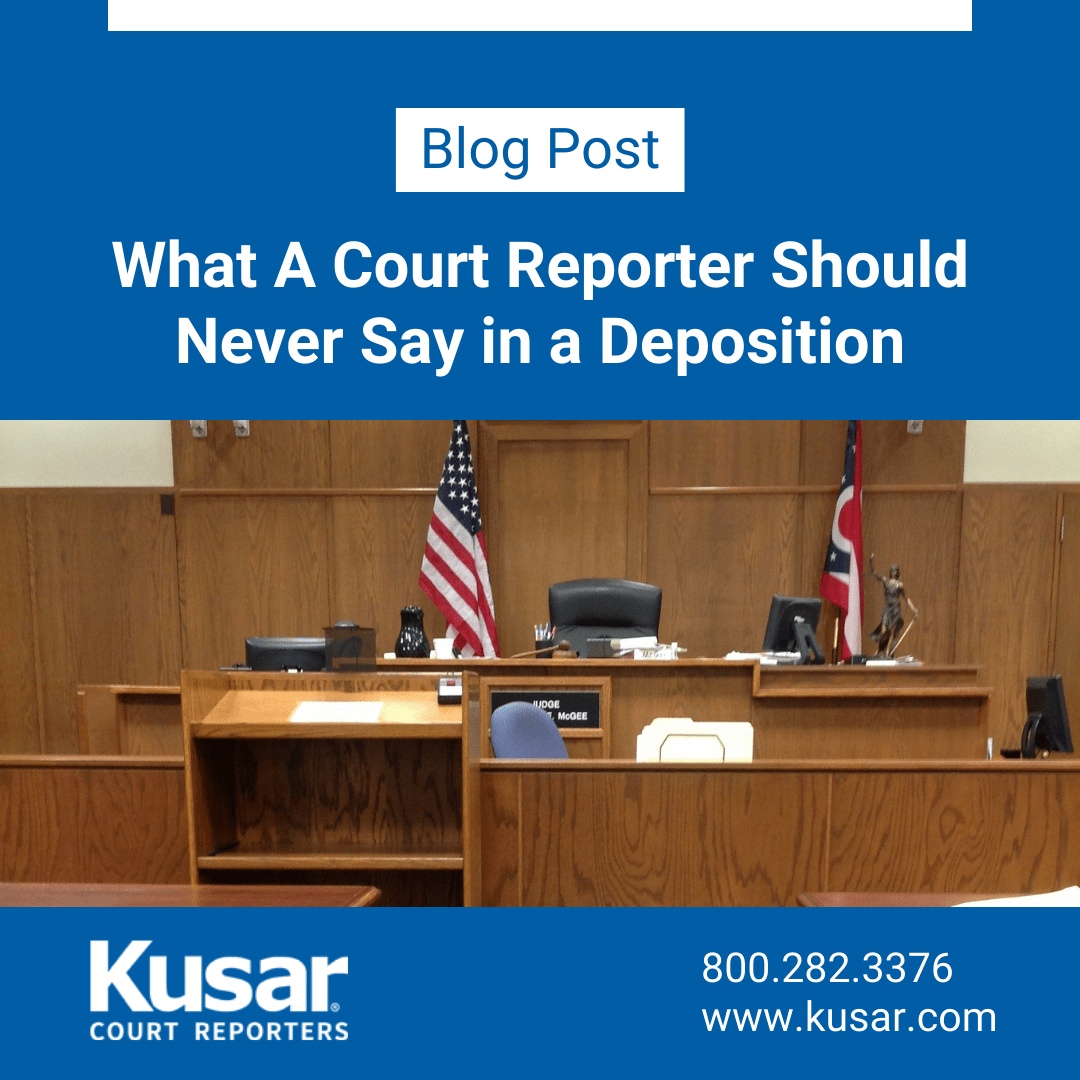
What A Court Reporter Should Never Say in a Deposition
Court reporters work hard to ensure the record is accurate in any legal proceeding, especially depositions. No word or sound or head nod can go unreported. Missing a single word or phrase can alter the meaning of an attorney’s questions or a witness’s testimony. One unfortunate reality of court reporting is that although many attorneys are cordial with one another in a deposition, adversarial situations do happen, and court reporters may find themselves in the middle, unsure of what to say or do next. While it may be difficult to stay silent, court reporters must make every effort to remain the neutral stenographer in the room.
At Kusar Court Reporters, we provide remote deposition services, real-time capabilities for depositions and trials, and other trial support services, and our team possesses the experience and tools you need in a court reporter. To learn more, contact us today by calling (800) 282-3376. To ensure we provide helpful information to fellow court reporters, attorneys, and witnesses, we have provided the information below discussing what a court reporter should never say in a deposition.
No. 1 – Never Ask To Cut a Deposition Short
Under Federal Rule of Civil Procedure 30(d)(1), Depositions by Oral Examination, a deposition is to last no longer than seven hours on one given day. However, parties can stipulate or agree to other time limits. Generally, whether in state or federal court, depositions can last an entire business day. Court reporters who have other obligations in the early evening may be concerned about when a deposition will be finished.
Court reporters should coordinate ahead of time to ensure they either do not make plans that may conflict with a deposition; or as soon as they find out there may be a problem, contact the firm they are working with to locate a replacement court reporter who can cover the deposition. Being present at the entire deposition without complaint is paramount to the integrity of the record and court reporting profession. When parties agree to continue a deposition from day to day, the court reporter should seek guidance from the attorneys before starting the first day of the deposition. Clarity is essential in the court reporting industry.
No. 2 – Never Tell an Attorney A Transcript Order Cannot Be Rushed
Attorneys and judges sometimes need transcripts on a rush basis, even if the transcript is in a rough draft condition. A court reporter should never say in a deposition that a rush request cannot be fulfilled. Court reporters should anticipate or ask ahead of time before the deposition begins whether a rush order of the transcript will be necessary. Telling an attorney that a transcript cannot be produced in the time requested is not a positive way to begin or end a deposition. A frustrated attorney may not return to the same court reporter if rush orders cannot be fulfilled.
No. 3 – Never Give A Personal Opinion About a Case
According to the National Court Reporters Association’s (NCRA) Code of Professional Ethics, court reporters must remain impartial to all parties present in a deposition or court proceeding. Providing an opinion about the strengths of a case is one of the things that a court reporter should never say in a deposition. Not only is providing an opinion inappropriate but doing so disrupts the flow of the deposition. A deposition that flows should never be interrupted.
Court reporters have the difficult task of recording every word and utterance. Testimony can evoke various feelings, some of which may be anger or disgust. Regardless of a court reporter’s feelings or opinions concerning the subject matter of a deposition, maintaining impartiality is critical.
No 4. – Never Go Off the Record Unless All Parties Agree
Court reporters are obligated to stay on the record unless and until all attorneys present agree to go off the record in a deposition. Some attorneys who become frustrated or adversarial may disagree that the proceedings should go off the record. The court reporter cannot agree to only one party’s request and must continue transcribing until all parties agree to go off the record.
While the court reporter can be placed in a difficult position, the record must continue. If a situation becomes too heated to continue the deposition, the court reporter should contact the court reporting company or colleagues for assistance. If the deposition is a remote proceeding, the court reporter is better positioned to avoid an unreasonably heated situation. An in-person deposition may present additional challenges to control a contentious situation.
No. 5 – Never Voice Frustrations Out Loud
Court reporters must learn to remain mute during a deposition proceeding except for matters regarding the procedural aspects of the deposition. For instance, it is perfectly acceptable to pause the deposition and ask an attorney or witness to speak louder. Additionally, politely suggesting that attorneys and witnesses do not talk over each other is common and necessary in some cases.
However, what a court reporter should never say in a deposition are statements critical of the attorneys, witnesses, or the subject matter of the case. Complaining about how a person speaks, a witness’s distracting hand movements, or how long an attorney is taking to ask questions are statements that should be avoided. No matter how frustrating a deposition can be, court reporters are expected to maintain cordiality and decorum throughout the entire proceeding.
Contact Kusar Court Reporters Today
Are you looking for a court reporter for your next deposition? Are you interested in utilizing a remote court reporter for your deposition? Knowing what a court reporter should never say in a deposition is an asset that not all court reporters share in the industry. At Kusar Court Reporters, we are prepared for any challenge. To find out how our outstanding team of professionals can assist you, reach out to us today by calling (800) 282-3376.

